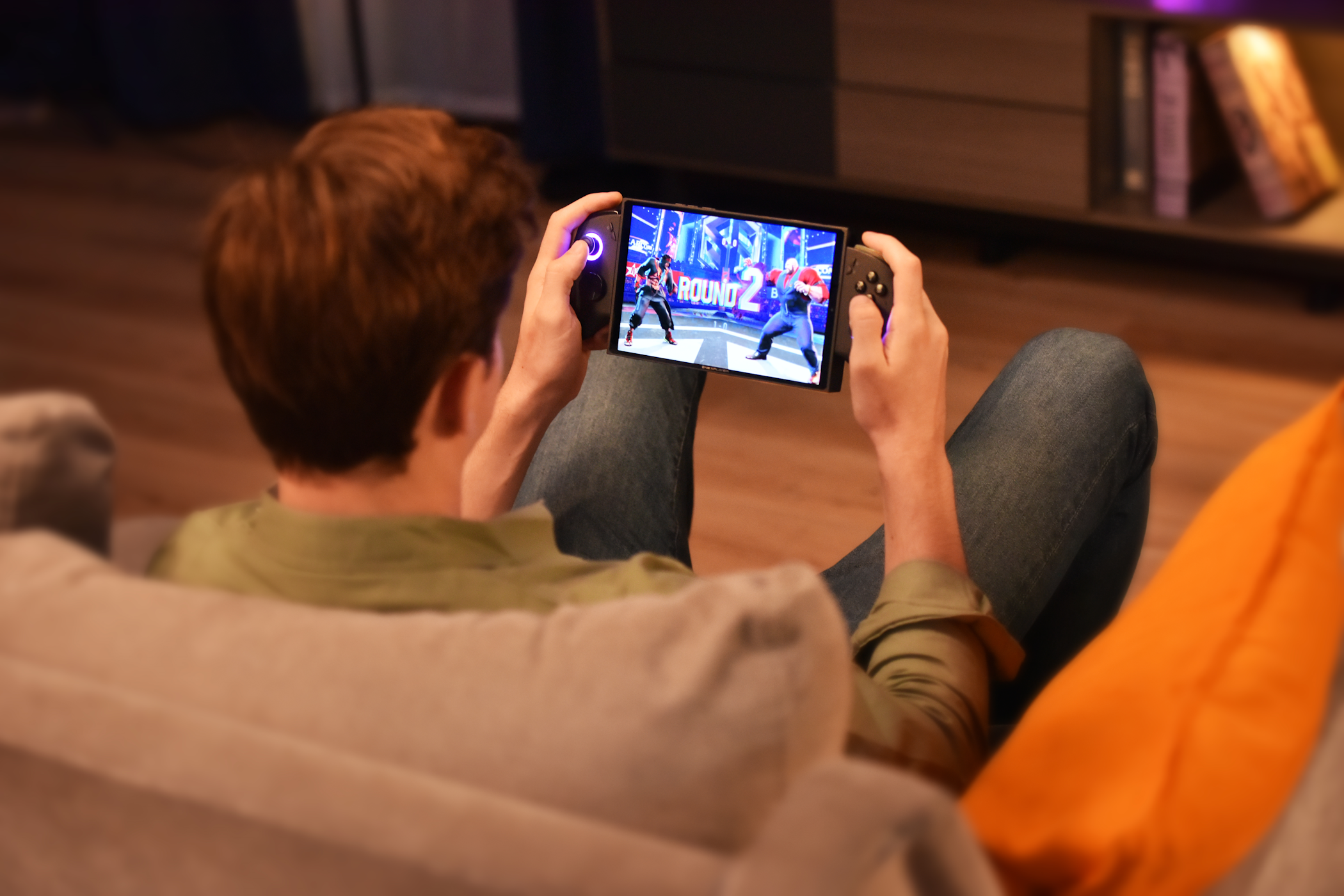How about they don’t? Open-source Linux, with contributions from gaming companies like valve, will always better for the consumer than a proprietary OS like Windows, that is designed by committee to show the most ads.
Linux is the new gaming os, Microsoft had too many Windows 8 moments.
You remember it as Windows 8. But Windows ME haunt me.
Thing is, ME as an idea made sense. Win2K wasn’t targeted to consumers, XP was in the pipeline for that, but they needed an interim version until it was ready. It looked like Win2K, but ostensibly compatible with the Win9x line. They just fucked up the execution on the internals, so it was terribly unstable.
Windows 8 had the opposite problem: it improved on Win7 internals, so it was solid, but had a terrible UI that no one asked for.
One could argue that the reason ME failed was very possibly because it was rushed. Win8, on the other hand, looks very much like designed by comitee with either very misguided designers or marketing people at the helm. Because of that, Win8 feels like a much worse failure to me.
It is my understanding that ME was the last DOS-based Windows. My understanding is you can find “MS-DOS 7.0” ISOs floating around out there which IIRC is the DOS version ME is based on that was never released separately but for some reason it happened in China? Like it was used in Chinese computer factories or something? Half remembering an LGR video or something?
I didn’t actually mind the UI once I got used to it. If they had just made some things optional UI wise they would have been fine I think. I hated vista because of all the random things they changed for no real reason that I could understand. They fixed a lot of that with 7, but 8 was a jump too far. It made some sort of sense on touch screens, but given that most devices running windows at the time weren’t touch screens it was problematic for long time users.
But around the same time they began pushing their hybrid surface devices and those all did have a touch screen so as a hardware decision I can still understand why they tried it.
I also kind of feel like it dumbed down a lot of the power user facing controls that most people coming from previous windows versions (especially XP) used pretty frequently. People talk a lot of trash about younger gens not being tech savvy and I feel like this is part of the reason. They couldn’t tell you what control panel was, wouldn’t know what to do with those settings if you told them, let alone using the run command to open msconfig, or the command line. They never had to do that because for them computers and phones just work (most of the time).
It’s frustrating the number of things I feel like Microsoft could have done to make 8 better that didn’t involved the adpocalypse nightmare that they have become with both 10 and especially 11.
Windows 8.1 was actually really good with the new UI that was closer to the other Windows versions, but with 8 underneath. Only issue was the same as with 7, that there were still elements of the previous Option menus, causing a lot of similar options to be in 2 completely different menus which made no sense.
And ended up tarnishing win2k’s good name. Many people think it was the same as ME.
Win2k is the only Windows which didn’t irritate me.
Tell us younglings why
There used to be two types of “Windows” in existence. The one based on NT which we use today, and the Win9x line that was basically just an advanced GUI on top of aging MS-DOS. Windows ME was the last of that line, where they tried to pack it full of modern features we’ve come to expect, but still on top of the unstable DOS core. It was an abomination.
I remember just skipping it and going from Win98SE straight to XP. That was the day 80s-style computing died for me, in 2002.
Yup. We had a 98 “home” PC that my mom, brother, and I used, then my dad had his PC for his graphics/web design work. He went to “upgrade” to ME, swore a bunch, then reverted to 98 until XP came out. I don’t think I ever fiddled with ME, but I’m glad I didn’t have to from all the horror stories. Granted I was maybe 12ish when all that happened, and I really only played games then (and finding certain images on certain websites once I discovered that was a thing), but I didn’t get into computers, tinkering, and Linux until high school when I got my own computer.
Neat! TIL
It was notoriously buggy and didn’t offer any reason to upgrade. Everyone stayed on 95, 98, 98se or migrated to Windows 2000. XP offered a compelling reason to upgrade with improved directx support and the rebase onto 2000 tech.
I beta tested 98, 98SE, ME, 2000, XP and a few other things.
deleted by creator
Less compatible than XP for sure, but home software wasn’t actively trying to target 2000 as a platform. I ran it from beta until XP’s release and found it much more stable than the 9x track.
deleted by creator
My usage lead to 3-4 blue-screen crashes every single day. Keep in mind a system reboot took up to 10 minutes, and there was no such thing as autosave. Back then Microsoft’s victims were conditioned to think this was quirky and unavoidable. This was on a vertically integrated, pre-built product from Gateway (covered in cow-print but that’s a cultural peculiarity from a different time) so there was no unsupported hardware to blame.
I remember the cowprint logos on computers :) was just a bit too young to use ME but I remember seeing it around. Wild how they charged money for that. I feel like people are still traumatized by this at my work. They’re afraid that if they touch something it will break and crash.
A lot of that instability was just budget 90s prebuilts being garbage. Gateway was close to eMachines tier as far as stability went. You had to spend 50-100% more money for something like a Micron desktop if you wanted reliability, or just build your own from reliable parts.
Lol. I remember playing the original Sims on a a windows ME emachine. It was a terrible computer but I was just happy to have access to games and the internet.
This, but on a SONY VAIO desktop. The switch to Windows 2000 was a godsend for that system.
I like how we’ve completely erased Vista from our collective memories at this point.
always better for the consumer
Always?
Yes. Windows changed from a high-quality OS that was designed to help users run applications, to a low-quality OS that was designed to show users ads. The latter will never be good for consumers.
No they really dont. Let windows die thw death its always deserved.
They don’t “need” to. There are games that companies refuse to let people run on Linux, so there will be a market for Windows, no matter how shit the experience is.
For now. If enough of the market shifts to Linux those companies will support Linux. Particularly since the CrowdStrike fiasco has spurred Microsoft to crack down on kernel level access which means the days of anti-cheat rootkits are numbered. It’s not going to be long before there’s no functional difference between gaming on Windows and gaming on Linux.
The ace in the hole though is that while Steam is effectively cutting down what Windows OSes it decides it’ll continue supporting, people will want an alternative to go to instead of feeling cornered with Windows 10 and 11. Because that’s all that they have right now for gaming, with Linux being optional, but gamers can be awfully picky about what they want to run.
Can SteamOS be installed on a desktop or is it only for the handhelds?
SteamOS is based on Arch with customization by Valve to make it immutable and a few other tweaks. In theory Valve will release SteamOS Holo (the version used on SteamDeck) for usage on Desktop at some point, but that hasn’t happened yet. In the meantime you can achieve very similar results to SteamOS a variety of ways. Depending on if you care about immutability or not there’s a number of non-Arch distros and even a install script (astOS) that can install Arch configured in an immutable fashion similar to what SteamOS does. There’s also a number of non-immutable gaming focused distros the most prominent of them being Manjaro. Any of them once you install Steam will function very similar to each other and SteamOS.
TIL Microsoft has a handheld gaming platform.
They effectively don’t. Several of the hardware OEMs saw the Steam Deck and rushed copies to market that run desktop Windows with some launcher they slapped together, and they don’t hold a candle to something someone thought about for a few minutes.
Microsoft flamed out of the mobile OS space precisely because they insisted that Windows not fork, but be identical software running on all devices.
So now, there is no such thing as a windows phone, but every time I wake up my computer I see a vestigial lock screen that I have to dismiss before I log in.
They designed their phones like a company entitled to 85% of the market share. Something tells me they’re not going to reform just to capture that mobile game space.
That Lock Screen is not vestigial, it still loads and displays bing ads. You are the product, not the customer.
I have never seen an ad on my lock screen. Possibly because of all the stuff I have disabled and the fact that I use windows 10. I have some questions.
To answer your question this is a Windows 11 thing. Windows 10 will be my Windows 7 which was my Windows XP, which was my Windows 98.
Tldr skip every other one.
What does the login screen have to do with mobile? They’ve had them since at least Windows 95 (I forget if 3.1 had one), and they’ve been evolving every release.
If you mean the screen before the login, that’s been around since at least Windows 95 too, though it didn’t used to be default and required you to press Ctrl+alt+del to dismiss (which before win95 would reboot your computer)
Let’s not bring this to their attention so we have more freedom from Microsoft.
I don’t think they care. With this console generation they have shifted away from treating gaming like a product with certain hardware and software. It’s more of a service thing to them with game pass and cloud gaming
I’m surprised Microsoft didn’t make an Xbox-like version of Windows to flash on for these handhelds yet.
The Xbox literally runs a custom build of Windows, that runs in a Virtual Machine, on top of another custom Windows based hypervisor. Then games are run in a separate VM.
All they’d have to do is port the hypervisor to different hardware, then the rest would run on top just fine.
Really, games run that far away from metal? Amazing, I didn’t have a clue.
Welcome to modern DRM.
Iirc it’s fairly lightweight without much overhead. It’s not as heavy as running VM your PC.
That sounds like driving a car by attaching the steering system and wheels to the steering wheel and pedals of another car.
Sounds like an episode of Top Gear
Do you have a source for this? Every time I’ve gone looking for details about the Xbox I’ve not found anything comprehensive.
Quick search …https://www.giantbomb.com/forums/xbox-one-8450/why-does-the-xbox-one-have-a-hypervisor-and-what-i-1437760/
Just search for Xbox hypervisor
Do you have a source for this? Every time I’ve gone looking for details about the Xbox I’ve not found anything comprehensive.
It’s spelled out in https://en.wikipedia.org/wiki/Xbox_system_software#Xbox_System_Software_(2013–present) and you can even ask Microsoft Copilot for details and it happily tells you.
Oh, I hope they don’t though
nope
Why do I get the weird feeling that they wouldn’t use Xbox, but rather Zune, if they did.
I mean, clearly they don’t. Every other company is still installing Windows. Any of them could install and sell them with Linux, and save a few bucks in the process, but they dont. An official SteamOS release won’t change that.
Isn’t that because Microsoft either pays system integrators to only install Windows or threatens that they will stop providing relatively cheap Windows keys if they provide the option to start with Linux? I could have sworn I’d heard that somewhere.
I’m sure you have. I’ve never seen any evidence to back that up. Pretty sure Windows doesn’t make the big bucks by paying OEMs to use their OS.
Microsoft make big buck by everyone and their dog having Windows PC and paying for O365. Especially corpos, that also pay for Teams, skype, azure, etc.
Ok forgive me for sounding stupid but imagine a tv with steam os built in.
I’d rather my TV be a TV, so that I can use it to display whatever I want, instead of being locked to a certain system and hardware configuration.
Same, all I want is a big display with good CEC support for volume, power on/off and input control.
In way it’s already a thing. You can install Steam Link on TVs running Android TV
True but imagine a gaming tv with all the hardware requirements, and true steam os, you could turn it on and load up a game straight from the tv and not have to stream it
That TV will be obsolete in a heartbeat, on top of being a pain in the ass to keep a good airflow.
Not necessarily if it was upgrade friendly and had a built in cooling chamber and or fan / vents, I’d say it’s doable
Or they could just put a port in the TV where you could plug in your choice of gaming device.
So basically attaching regular PC to the TV…
I find moonlight/sunshine work better, also available on android tvs
No. Bad.
As a virtual machine I could see that and it’s possibly the only way such a product would be viable. The thing is, stadia tried this in a round about fashion and it failed. Geforce now does basically this and it’s available as an app on lots of streaming boxes and smart TVs. So effectively this kind of already exists in a way that’s less prone to obsolescence but I’m not sure most people want it because of the tradeoffs of a required internet connection etc. It’s the kind of thing that sounds like something people would want until you even stop to think about it for a moment. The more you think about it the worse an idea it seems.
There’s different demographics of gamers out there. It’s not useful to most of them for lots of reasons like built in anti-cheat, drm, requirement of an internet connection even for solo/story mode games, the fact that some gamers want bleeding edge everything while others want stability. Still others only play older games and for them this doesn’t do much except make finding drivers and virtual environments harder. Then there’s the mod community etc. It just seems like it would be a nightmare for a lot of people.
Also. If you’ve ever taken apart a modern TV you know how finicky and fragile some of the parts and pieces are. I wouldn’t want to attempt to upgrade my ram just to end up damaging the backlight module or the screen.
I don’t know that valve needs to bring steamOS to other devices. Pretty sure Bazzite is good enough for most folks.

















